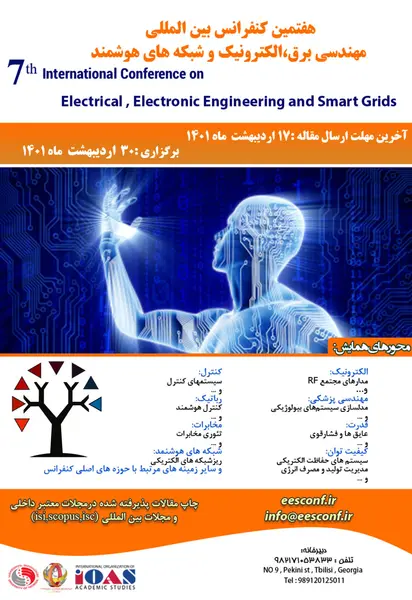-
investigation and analysis of energy management system in a microgrid with the presence of renewable units
جزئیات بیشتر مقاله- تاریخ ارائه: 1401/02/20
- تاریخ انتشار در تی پی بین: 1401/03/25
- تعداد بازدید: 196
- تعداد پرسش و پاسخ ها: 0
- شماره تماس دبیرخانه رویداد: 02171053833
investigation and analysis of energy management system in a microgrid with the presence of renewable units
in recent years, the power system has been evolved into microgrids, which are little pockets of self-contained entities. different distributed, interconnected generation units, loads, and energy storage units make up a typical microgrid system. the increased energy efficiency of these units on microgrids is gaining popularity day by day. because of their stochastic behavior, renewable generation causes an imbalance in the power system, which needs microgrid energy management.
renewable energy sources have emerged as an alternative to meet the growing demand for energy, mitigate climate change, and contribute to sustainable development. the integration of these systems is carried out in a distributed manner via microgrid systems; this provides a set of technological solutions that allows information exchange between the consumers and the distributed generation centers, which implies that they need to be managed optimally. energy management in microgrids is defined as an information and control system that provides the necessary functionality, which ensures that both the generation and distribution systems supply energy at minimal operational costs.
this paper presents a literature review of energy management in microgrid systems using renewable energies, along with a comparative analysis of the diferent optimization objectives, constraints, solution approaches, and simulation tools applied to both the interconnected and isolated microgrids. to manage the intermittent nature of renewable energy, energy storage technology is considered to be an attractive option due to increased technological maturity, energy density, and capability of providing grid services such as frequency response. finally, future directions on predictive modeling mainly for energy storage systems are also proposed.
حوزه های تحت پوشش رویداد
مقالات جدیدترین رویدادها
-
استفاده از تحلیل اهمیت-عملکرد در ارائه الگوی مدیریت خلاقیت سازمانی و ارائه راهکار جهت بهبود
-
بررسی تاثیر ارزش وجوه نقد مازاد بر ساختار سرمایه شرکت های پذیرفته شده در بورس اوراق بهادار تهران
-
بررسی تأثیر سطح افشای ریسک بر قرارداد بدهی شرکت های پذیرفته شده در بورس اوراق بهادار تهران
-
بررسی تأثیر رتبه بندی اعتباری مبتنی بر مدل امتیاز بازار نوظهور بر نقد شوندگی سهام با تأکید بر خصوصی سازی شرکت ها
-
تأثیر آمیخته بازاریابی پوشاک ایرانی بر تصویر ذهنی مشتری پوشاک ایرانی (هاکوپیان)
-
بررسی تغییرات الکتروکوکلئوگرافی و پاسخهای شنیداری ساقه مغز در 100 بیمار مبتلا به منیر در بیمارستان رسول اکرم (ص) 1379-1377
-
تأثیر هوش هیجانی، ویژگی های شخصیتی و روابط بر تمایل به تغییر رفتار مصرف کننده در صنعت ورزش
-
واکاوی وضعیت آموزش مهارت های اساسی زندگی در پایه ششم ابتدایی از دیدگاه معلمان و متخصصان
-
بازشناسی راهکارهای طراحی مطابق با الگوهای پایداری محیطی در معماری بافت قدیم بوشهر
-
بررسی آزمایشگاهی رفتار شمع پافیلی تحت بارهای کششی مایل در خاک ماسه ای
مقالات جدیدترین ژورنال ها
-
مدیریت و بررسی افسردگی دانش آموزان دختر مقطع متوسطه دوم در دروان کرونا در شهرستان دزفول
-
مدیریت و بررسی خرد سیاسی در اندیشه ی فردوسی در ادب ایران
-
واکاوی و مدیریت توصیفی قلمدان(جاکلیدی)ضریح در موزه آستان قدس رضوی
-
بررسی تاثیر خلاقیت، دانش و انگیزه کارکنان بر پیشنهادات نوآورانه کارکنان ( مورد مطالعه: هتل های 3 و 4 ستاره استان کرمان)
-
بررسی تاثیر کیفیت سیستم های اطلاعاتی بر تصمیم گیری موفق در شرکتهای تولیدی استان اصفهان (مورد مطالعه: مدیران شرکتهای تولیدی استان اصفهان)
-
پیش بینی انسجام و کارکردهای خانوادگی در زوج ها، براساس عمل به باورهای دین
-
جرم شناسی اطفال و ارزیابی شخصیت اطفال بزهکار
-
تجلی مضامین دینی در نقوش انسانی ظروف سفالین دوره سلجوقی
-
determination of organochlorine and organophosphorous pesticide residues in irrigated water from gubi, waya dams and gudum fulani irrigation sites in bauchi lga, bauchi state,nigeria using composite sampling
-
investigation into the effect of bed stiffness on seismic performance of concrete gravity dam under far- and near- field earthquakes




سوال خود را در مورد این مقاله مطرح نمایید :